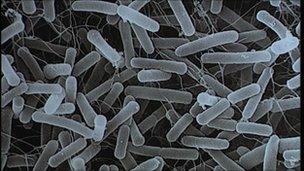Q&A: What is ESBL E. coli?
- Published

ESBL E. coli is a different bug to E. coli O157 which causes food poisoning
Investigations are continuing at a Swansea hospital after two babies died after an ESBL E. coli infection.
Professor Hugh Pennington, a microbiologist who has chaired inquiries into E. coli outbreaks in Wales and in Scotland, explained to BBC Wales what the bug is and how it can spread.
Q: What exactly is ESBL E. coli?
A: These are relatively new bugs, they first appeared about 10 years ago in Britain.
They have been around in other parts of the world longer than that but they're quite different from E. coli that caused the food poisoning outbreak in south Wales and other big ones over the years.
They're much more like the normal sort of E. coli. Everyone has E. coli in their intestine. But these have picked up genes that make them resistant to antibiotics so they're quite difficult to treat when they cause problems.
But when they do, it's usually infections in the bladder and that sort of thing that are traditional for E. coli.
But if they get into places like special care baby units where the very very young babies, very susceptible to infection, there can be problems, as we have seen here.
Fortunately that doesn't happen very often. There have been one or two outbreaks and with related bugs in the same family of bugs but fortunately it's a very unusual occurrence.

Professor Hugh Pennington is a microbiologist who has chaired inquiries into E. coli outbreaks
Q: Are premature babies particularly vulnerable to the infection because their immune systems are not yet fully developed?
A: That's right. We have known this for a long time with bugs like E. coli, which normally are not particularly harmful.
But when a very, very small baby - a very premature baby - is infected with one of these bugs they can get really very serious complications like meningitis for example.
'Unusual'
It can really be very difficult to treat even if the bug is not resistant to antibiotics because babies don't have a fully developed immune system, which is one of the ways we fight bugs.
It's not that just you give them antibiotics, the antibiotics actually help your own immune system to see off the bug.
If that's not working terribly well, not yet fully developed, it's much more difficult to treat.
Q: How can an infection take hold in a hospital where safeguards are in place to try to stop bugs like these spreading?
A: Many years ago when babies were in hospital they did get infected really quite often unfortunately.
But that was in the long distant past. Nowadays it's really very unusual for these places because they spend so much time having really really high quality infection control processes.
And it's down to the usual things we know about, like hand washing, very very vigorous cleaning and making sure that everyone is doing all the things they should be doing in terms of infection control. And they're very very good at it.
So when we get one or two cases such as we have seen here, clearly there's a big investigation to find out what went wrong.
And in recent years they haven't actually come up with anything. They haven't come up with any faults or anything like that.
I think one of the problems with these bugs is that they are really very clever at spotting a weakness, as it were, and exploiting it.
And it may be a weakness that's not particularly obvious. And so the investigation into these small outbreaks haven't really come back with any results in the places.
It's just the bugs themselves - one minor thing and away the bugs go, particularly with these vulnerable kids.
One of the problems with this E. coli, it can be present in normal people without them knowing about it.
It doesn't cause any problems for them. It's found in normal people in quite large numbers without causing any illnesses at all. So that's one of the ways that the bug lurks there.
They spread through the community. They're mostly in the community - they are not actually hospital bugs like the traditional MRSAs that we've seen.
Prof Pennington was being interviewed by BBC Radio Wales.
- Published23 November 2011
- Published22 November 2011